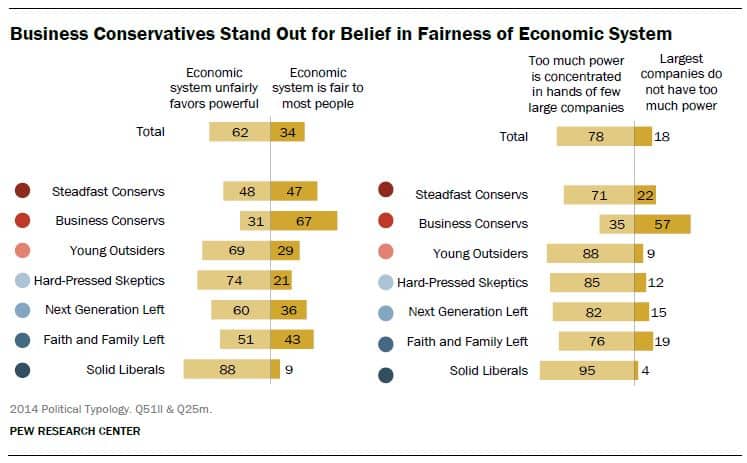A recent Pew Research Center poll on political attitudes and polarization that is making the rounds, "Beyond Red vs. Blue: The Political Typology," shows something that Democratic politicians should pay attention to this election season, because conservatives certainly are. (Note: You can take a quiz to see where you stand in Pew's "Political Typology.")
The poll's Section 3: Fairness of the Economic System, Views of the Poor and the Social Safety Net shows, as Jaime Fuller at The Washington Post explains, that when Sen. Elizabeth Warren says the U.S. economy is rigged, "many conservatives agree."
According to a new Pew survey, 62 percent of Americans think that the economic system unfairly favors the powerful, and 78 percent think that too much power is concentrated in too few companies. The discontent isn't limited to those who share Warren's liberal ideology; 69 percent of young conservative-leaning voters and 48 percent of the most conservative voters agree that the system favors the powerful, according to Pew. (Emphasis added.)
This is exactly the case that is being made by Warren – and disputed by "centrist" Democrats like those at Third Way. (Note that Third Way's Board is almost entirely populated by Wall Streeters.)

Democrats running for office should pay attention to this survey. Americans are hungry for "populist" solutions that help regular working Americans. They are tired of a political system that rigs the game for Wall Street and the giant multinational corporations. (Please visit PopulistMajority.org - "Exposing the gulf between American opinion and conventional wisdom" - for more information on the populist opinions of Americans.)
Conservatives Just Wrong On Facts
Interestingly some of the poll questions ask for opinions on what turn out to be facts. And the answers that get the facts just wrong are the answers to which Pew assigns the label "conservative."
In particular, there are questions about social mobility and whether people who work hard can get ahead if they work hard. Meanwhile recent scientific studies have shown that social mobility in the United States has declined – too many people can't get ahead even if they work hard.
Other questions ask whether government assistance to the poor "does more harm than good." (This is the conservative "dependent on government" propaganda argument.) In fact, many working people are on government assistance because wages have fallen so low. Raising the minimum wage, addressing income inequality, offering free college education, a decent health care system, providing child care to working families, and programs to bring full employment are also ways of "giving assistance to the poor." And, sadly, there are facts about whether discrimination keeps African Americans from finding good-paying jobs. (Hint: It does.)
P.S. Some questions are asked in a misleading way. A question about protecting the environment implies there is a "cost" to doing so. But 56 percent of the public agreed anyway. Another, "The government should do more to help needy Americans, even if it means going deeper into debt," directs people toward a particular answer by introducing the misleading "debt" argument, which led to only 43 percent of the public agreeing. Many issues are more complex than our media and organizations like Pew are prepared to allow for.

